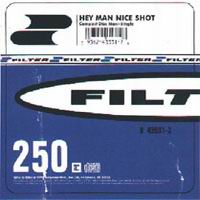Lyrics and music
The song was written about the public suicide of Pennsylvania state treasurer R. Budd Dwyer on January 22, 1987, in Harrisburg, Pennsylvania. Dwyer had been convicted of bribery charges in December 1986, and was expected to receive a lengthy sentence from U.S. District Court Judge Malcolm Muir. Professing his innocence and decrying the legal system, Dwyer shot and killed himself with a .357 Magnum revolver during a live televised press conference. [7] Filter frontman Richard Patrick grew up in a neighboring state and said he had been affected by seeing the incident on the TV news, describing it as "a scary topic" for him. [8]
Patrick has said that the song was inspired by a videotape containing raw footage of Dwyer's suicide that he picked up from a bookstore on the 1991 Lollapalooza tour, while touring with Nine Inch Nails. [9] The bridge of Marilyn Manson's "Get Your Gunn" (1994) includes audio from the press conference where Dwyer shot himself, including the sound of the gunshot that killed him. [10] [11] When Marilyn Manson sampled the audio of Dwyer's suicide, Manson claimed that Patrick heard the sample and was excited by it. Despite the inconsistencies of the timeframe ("Get Your Gunn" was recorded in late 1993), Manson believes that this interaction inspired Patrick to write "Hey Man Nice Shot". Reflecting on the sample, Manson said "He wouldn't have even heard it if I didn't play it.... I don't like him very much. He bothers me." [10]
Although Patrick frequently clarified this in interviews, emphasising the fact that he had first written the song in 1991 before the band even had a record deal, the song's popularity was augmented by a widespread perception that it was about the 1994 suicide of Kurt Cobain. [7] [12] [13] [14]
Musically, the verses of the song feature a "bed of ambient guitar" made with looped feedback [15] as well as a distinctive palm-muted bass line, contrasting with the louder, guitar-heavy choruses and ending.
This page is based on this
Wikipedia article Text is available under the
CC BY-SA 4.0 license; additional terms may apply.
Images, videos and audio are available under their respective licenses.
